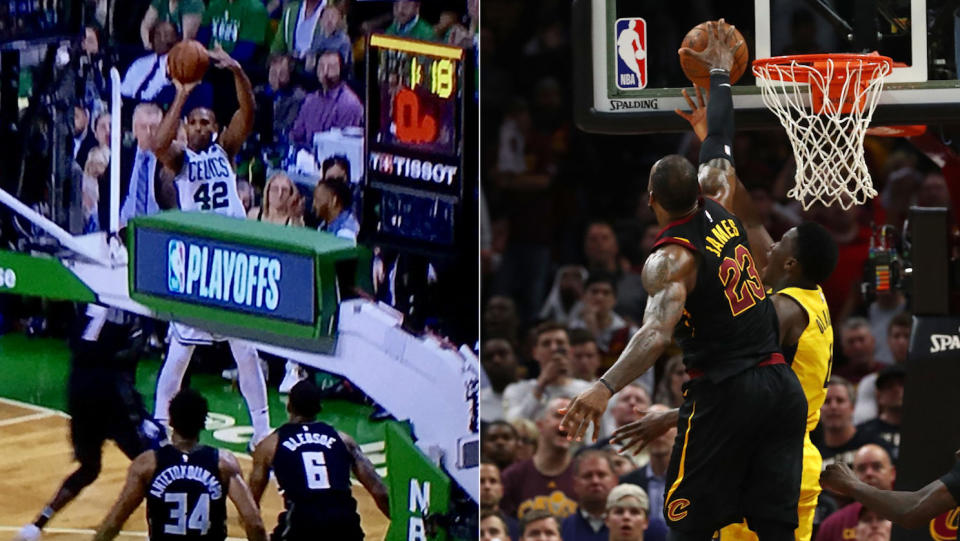LeBron James' goaltend, Al Horford's shot-clock violation and rethinking the NBA review process

Two nights in a row now NBA officials have missed potential series-altering calls, failing to blow the whistle in the final minutes of Game 5 in both the Boston-Milwaukee and Cleveland-Indiana series.
Both plays — Al Horford’s shot-clock violation with 1:19 remaining in Tuesday’s Celtics win and LeBron James’ goaltending of Victor Oladipo with three seconds left in Wednesday’s Cavaliers victory — fall into the same category: Neither were reviewable once the referees kept their whistles in their pockets.
The question here is whether the NBA should change that policy.
Because there was no call when Horford released the ball after the shot clock had expired …
… and because there was no call when James blocked Oladipo’s shot after it hit the backboard …
… both were tense live-ball situations in the waning moments of first-round series tied two games apiece. To pause play for review would disrupt momentum enough that as of now the NBA does not allow officials to whistle the ball dead, send the call for review in Secaucus, N.J., and get it right.
The ramifications are untold.
A shot-clock violation in Boston would have given Milwaukee the ball down 84-79 with plenty of time remaining. Instead, the Celtics retained possession on the rebound, and the Bucks didn’t get the ball back for 26 more seconds — a lifetime so late in a game. There’s no telling what might have happened in the alternate universe where the officials got the call right, but the Bucks sure could have used that extra time in this world, where they trimmed the lead to one possession with 18 seconds remaining.
Likewise, goaltending in Cleveland would have given Indiana a 97-95 lead with three seconds left. Instead, J.R. Smith grabbed the rebound and called timeout, the Cavaliers inbounded to LeBron at halfcourt, and we know what happened next. We assume the Cavs would have still called timeout and inbounded to LeBron down two, but again, there’s no telling how the game would have played out in this alternate reality. Would the Pacers have fouled up two? (We wonder why they didn’t with one to give anyhow.) Would Cleveland have called a different play knowing a miss would have resulted in a 3-2 series deficit? Would the pressure of trailing in the game altered LeBron’s comfort level on the shot?
Nobody is debating whether these were violations. In the Last Two Minute Reports for each game, the NBA ruled that the clock expired before Horford’s release and that LeBron’s block came after Oladipo’s shot hit the backboard. Even James conceded, “I definitely thought it was a goaltend.” They were blown calls that potentially altered the course of the playoffs. There’s no getting around it.
But once those calls were not made, by the letter of NBA law, nothing could be done:
NBA Crew Chief Ken Mayer met with pool reporter Kyle Hightower after the game between the Bucks and the Celtics. A transcript has been posted on https://t.co/edslpDoppx pic.twitter.com/plUHQ1C1wi
— NBA Official (@NBAOfficial) April 25, 2018
Joe Borgia, NBA Senior Vice President of Replay & Referee Operations, joined @NBATV to discuss a couple of challenging plays from the Indiana Pacers-Cleveland Cavaliers game and why replay was not used. pic.twitter.com/UcAaR6HLc9
— NBA Official (@NBAOfficial) April 26, 2018
Bucks guard Eric Bledsoe called the missed call “bulls***” on Tuesday, and Milwaukee coach Joe Prunty was still stewing about it a day later, wondering what could be done to correct this injustice.
Similarly, Oladipo told reporters Wednesday, “I guess it’s a tough play at the time for them, but it was a goaltend. It’s hard to even speak on it, honestly. It just sucks. It really sucks. Even though we fought our way back, we tied the game up, that layup is huge. Give [LeBron] credit where credit is due. The 3 was big-time, definitely huge, but who’s to say they even run that play? You don’t know what happens. So, it’s unfortunate. It really sucks that they missed it, but we can’t do anything about it now.”
Oddly, both plays resulted in fairly quick whistles. Bucks forward Thon Maker fouled Celtics guard Terry Rozier on Horford’s long miss, and Smith called timeout immediately upon gaining possession of LeBron’s block. Perhaps the league could look into allowing for replay under similar circumstances, when the perfect opportunity arises to review a blown call immediately after the play in question.
Maybe the league could encourage officials to blow the whistle on potentially reviewable plays. If it might have been a shot-clock violation or it could have been a goaltend, make the call. These aren’t judgment fouls. They can blow the whistle, look at the tape and determine if it was the correct call.
Imagine, though, if Milwaukee rebounded Horford’s miss and was streaking toward a transition layup when a whistle was blown, negating a clutch bucket, only to reveal that, yes, the ball belongs to the Bucks, who must then face Boston’s defense in a halfcourt setting. Imagine if Horford got his shot off in time, an official blew his whistle before Boston secured the rebound, and then a post-review jump ball gave Milwaukee possession. Imagine if LeBron’s block was clean, Smith saw an opportunity to push the ball rather than call a timeout, and he made a 30-foot buzzer-beater to win the game, but an official whistled the ball dead just before he got it off and they had to replay those last three seconds.
Still, it does seem like there’s a split second between a violation and play resuming in earnest — the moment when one side secures the ball (when Rozier or Smith gain possession) — that would allow for a review. Then, not only are you opening the door for more reviews in a game that has too many stoppages in the final two minutes, but you’re relying on officials to whistle the play dead at precisely the right time, which might be too much to ask, since they’re the same refs who just blew a call.
There are so many variables, the worst of which we saw play out on back-to-back nights. So, can the NBA do something about it? Can the league change the rules to allow for review, especially in such instances where the integrity of playoff series-swinging games are on the line? That would fall on the competition committee this summer. As of now, though, there is no known plan to address such instances, according to a league source, since stopping live action can also impact a game’s integrity.
“But that doesn’t mean it couldn’t happen,” the source added.
Then, even if the committee signed off on a change, the NBA’s board of governors would have to give its stamp of approval, so don’t wait by the phone (if people still do that) for a new rule this summer.
We can’t expect perfection from humans, but ultimately the onus falls on the officials to be better. This is where we should note that: a) The officials also missed a late foul in Game 4 of Celtics-Bucks that would have likely given Boston a win, and b) On the play before LeBron’s goaltend, the referees incorrectly awarded Indiana the ball after Pacers forward Thaddeus Young knocked it out of bounds. So, maybe all this human error has a way of working itself out in the end. Or so we’d like to think.
– – – – – – –
Ben Rohrbach is a writer for Yahoo Sports. Have a tip? Email him at rohrbach_ben@yahoo.com or follow him on Twitter! Follow @brohrbach
More from Yahoo Sports:
• Offensive tweets from Josh Allen surface
• Griffin will likely have long wait in NFL draft
• Audio of ‘confidential’ NFL players-owners meeting leaks
• LeBron’s buzzer-beating 3-pointer sinks Pacers


